人教版(2019)选择性必修第三册 3 Environmental Protection Learning About Language 课(共26张PPT)
文档属性
| 名称 | 人教版(2019)选择性必修第三册 3 Environmental Protection Learning About Language 课(共26张PPT) | 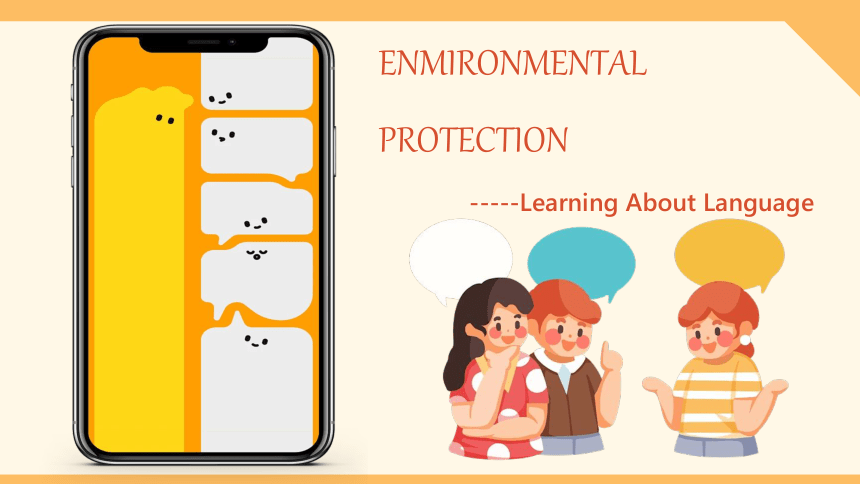 | |
| 格式 | pptx | ||
| 文件大小 | 36.9MB | ||
| 资源类型 | 教案 | ||
| 版本资源 | 人教版(2019) | ||
| 科目 | 英语 | ||
| 更新时间 | 2024-04-03 22:23:55 | ||
图片预览

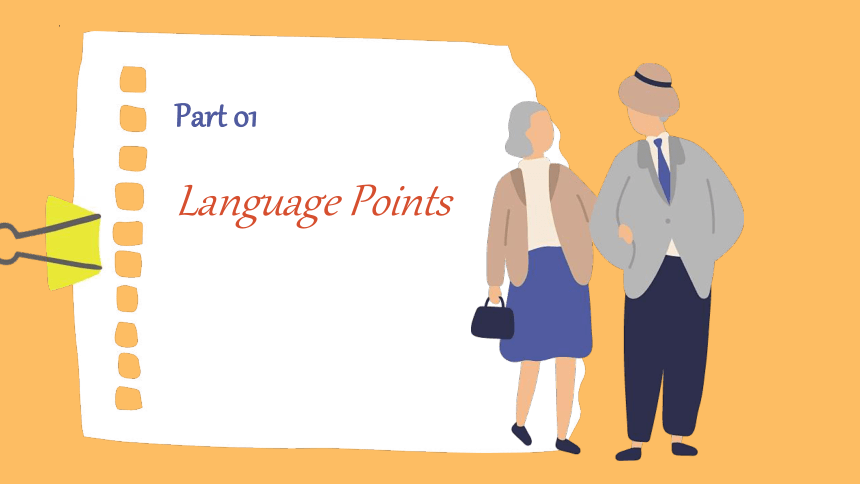

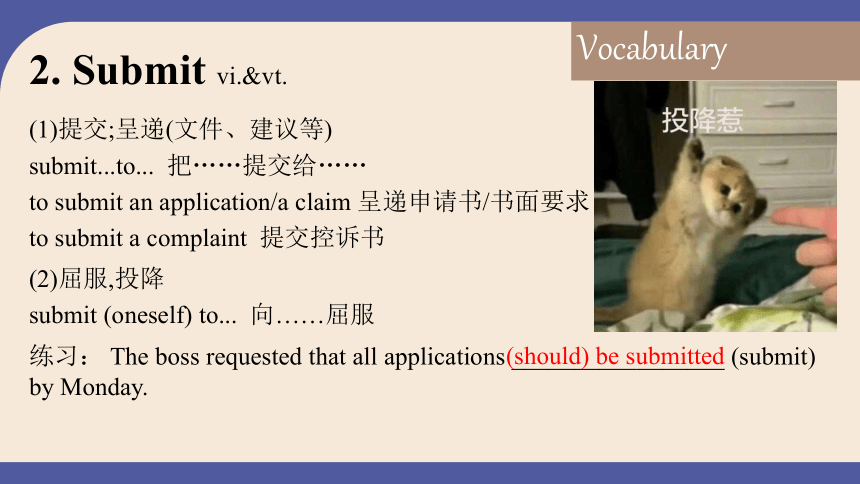
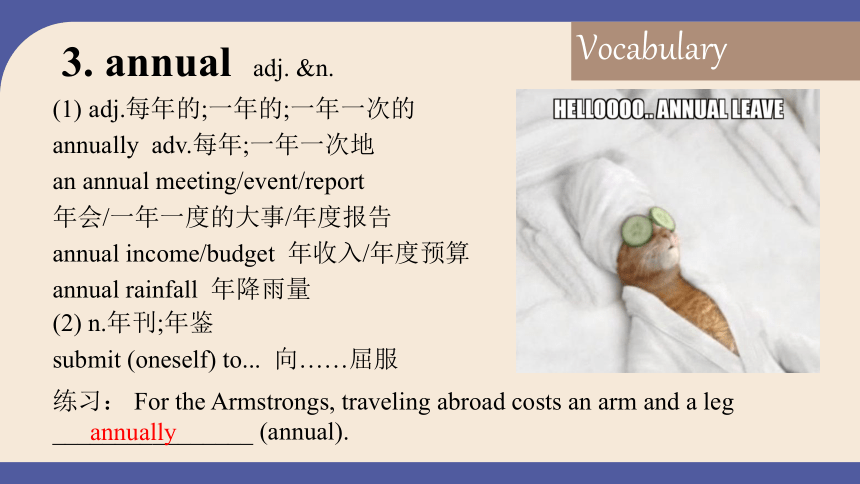
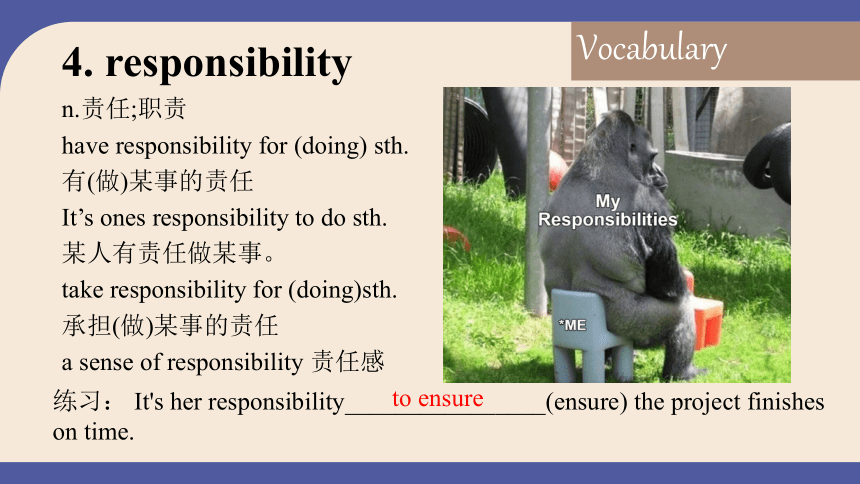
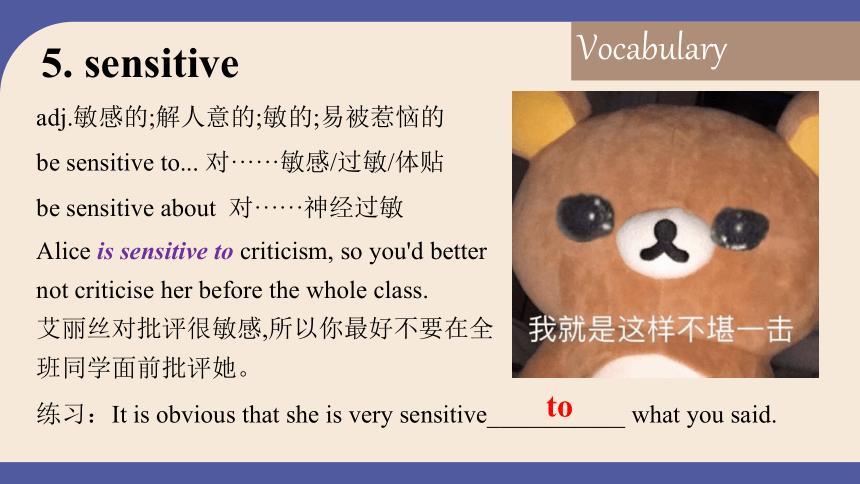
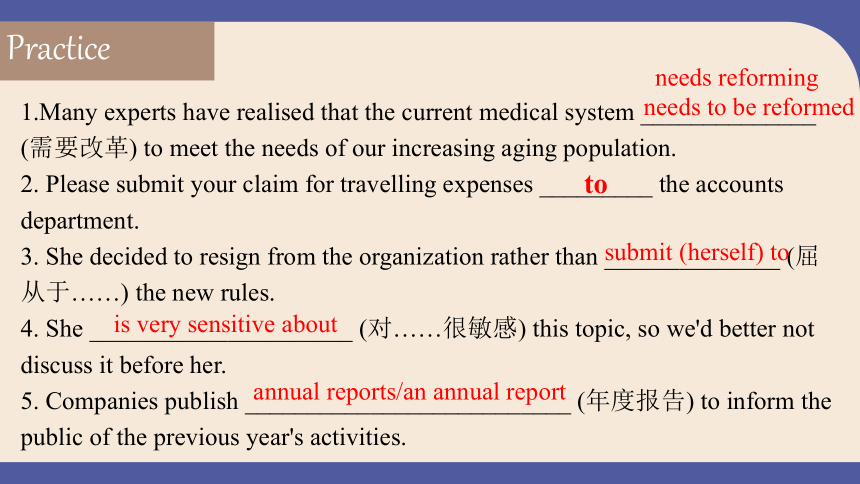

文档简介
(共26张PPT)
ENMIRONMENTAL PROTECTION
-----Learning About Language
Part 01
Language Points
Vocabulary
1. reform
vi.&vt.改革;(使)改正;改造(行为)
As far as I am concerned, the law needs to be reformed.
依我看,这部法律需要进行改革。
n.改革;变革;改良
a government committed to reform 致力于改革的政府
far-reaching/major reforms 意义深远的/重大的变革
economic reform 经济改革
the reform of the educational system 教育体制的改革
练习: Our government ________________________ (致力于改革) for many years.
has been committed to reform
Vocabulary
2. Submit vi.&vt.
(1)提交;呈递(文件、建议等)
submit...to... 把……提交给……
to submit an application/a claim 呈递申请书/书面要求
to submit a complaint 提交控诉书
(2)屈服,投降
submit (oneself) to... 向……屈服
练习: The boss requested that all applications _________________ (submit) by Monday.
(should) be submitted
Vocabulary
3. annual adj. &n.
adj.每年的;一年的;一年一次的
annually adv.每年;一年一次地
an annual meeting/event/report
年会/一年一度的大事/年度报告
annual income/budget 年收入/年度预算
annual rainfall 年降雨量
(2) n.年刊;年鉴
submit (oneself) to... 向……屈服
练习: For the Armstrongs, traveling abroad costs an arm and a leg ________________ (annual).
annually
Vocabulary
4. responsibility
n.责任;职责
have responsibility for (doing) sth.
有(做)某事的责任
It’s ones responsibility to do sth.
某人有责任做某事。
take responsibility for (doing)sth.
承担(做)某事的责任
a sense of responsibility 责任感
练习: It's her responsibility________________(ensure) the project finishes on time.
to ensure
Vocabulary
5. sensitive
adj.敏感的;解人意的;敏的;易被惹恼的
be sensitive to... 对······敏感/过敏/体贴
be sensitive about 对······神经过敏
Alice is sensitive to criticism, so you'd better not criticise her before the whole class.
艾丽丝对批评很敏感,所以你最好不要在全班同学面前批评她。
练习:It is obvious that she is very sensitive___________ what you said.
to
Practice
1.Many experts have realised that the current medical system ______________ (需要改革) to meet the needs of our increasing aging population.
2. Please submit your claim for travelling expenses _________ the accounts department.
3. She decided to resign from the organization rather than ______________ (屈从于……) the new rules.
4. She _____________________ (对……很敏感) this topic, so we'd better not discuss it before her.
5. Companies publish __________________________ (年度报告) to inform the public of the previous year's activities.
needs to be reformed
needs reforming
to
submit (herself) to
is very sensitive about
annual reports/an annual report
Practice
6. You are required ______________ (submit) a final draft of your essay on March 9.
7. There are three books I reread _________ (annual).
8. Residents are responsible ______________ keeping their rooms, kitchens and shower rooms clean and tidy.
9. I learned that a fish is a cold-blooded animal and therefore is very sensitive ______________ water temperature.
10. Exercising makes you more awake and ready to handle _________________ is ahead of you for the day.
annually
to submit
for
to
what/whatever
Part 02
Direct speech
&
Indirect speech
"Let’s work together to stop climate change," the expert said.
The expert advised us to work together to stop climate change.
Can you find out the differences
The reporter asked," How can we save polar bears from extinct "
The reporter asked how we could save polar bears from extinction.
Can you find out the differences
Difference:
Rules: Direct speech reports the exact words of the speaker. Indirect speech reports what a speaker said in our own words.
If we want to change direct speech into indirect speech, we will change tenses, pronouns, and other words when necessary. First, if a verb in quotation marks is in present tense, change to corresponding past tense; if a verb is in simple past tense, change to past perfect tense. Second, person pronouns change according to the person of the object of the reporting verb. Third, adverbs that show nearness in direct speech are usually changed into words that show distance in direct speech.
基本概念
(1) 直接引语:直接引述别人的话,把它放在引号内,叫直接引语。
(2) 间接引语:用自己的话转述别人的话,叫间接引语。
直接引语变为间接引语时,从句中的人称、时态、指示代词、时间状语和地点状语等一般均要作相应的变化。
人称的变化
直接引语变为间接引语时,人称的变化遵循以下原则。
(1)一随主:直接引语中出现的第一人称代词要按照引述动词的主语的人称变化。
She said, "I won't be frustrated."
She said that she wouldn't be frustrated.
她说她不会沮丧的。
(2)二随宾:直接引语中出现的第二人称代词要按照引述动词的宾语的人称变化,若引述动词后没有宾语,也可用第一人称。
I told Mary, "We will protect you from infection."
I told Mary we would protect her from infection.
我告诉玛丽我们会保护她不受感染。
人称的变化
直接引语变为间接引语时,人称的变化遵循以下原则。
(3)第三人称不更新:直接引语出现的第三人称代词一般不需要变化。
She said to me, "They want to decrease the amount of fat they eat."
She told me that they wanted to decrease the amount of fat they ate.
她告诉我,他们想减少脂肪的摄入量。
时态的变化
直接引语变为间接引语时,如果主句是过去的某种时态,则大多数情况下间接引语的时态应相应向前推一个时态,如下所示:
一般现在时→一般过去时
现在进行时→过去进行时
现在完成时→过去完成时
一般过去时→过去完成时
过去完成时→过去完成时(不变)
(1)如果直接引语中有明确的表示过去时间的状语,变为间接引语时,时态不变。
My father said to me, "The house was completely transformed in 2017."
My father told me that the house was completely transformed in 2017.
(2)如果直接引语表述的是客观真理,变为间接引语时,时态不变。
The geography teacher said to us, "The earth travels around the sun."
The geography teacher told us that the earth travels around the sun.
指示代词、时间状语、地点状语和动词的变化
(1)指示代词
this → that these → those
He said to me, "This is the School Computer Centre."
他告诉我,这是学校计算机中心。
He told me that was the School Computer Centre.
(3)地点状语
here → there
(4)动词
come → go
bring →take
now→then today→that day
this morning/week→that morning/week
yesterday→the day before
yesterday morning→the morning before
next week→the next week/the following week
last week→the week before
two days ago→two days before
(2)指示代词
句型的变化
(1)直接引语是陈述句,间接引语用连接词that引导,that可省略。
His mother said to me, "Mr. Smith is in charge of the work."
His mother told me (that) Mr. Smith was in charge of the work.
他的母亲告诉我,史密斯先生负责这项工作。
(2)直接引语是一般疑问句间接引语用 whether/if引导,疑问语序变为陈述语序,谓语动词say (said)改为ask (asked)。
Mr. Brown said to me, "Are your injuries severe "
Mr. Brown asked me whether/if my injuries were severe.
布朗先生问我伤势是否严重。
句型的变化
(3)直接引语是特殊疑问句,间接引语用原来的疑问词引导,疑问语序变为陈述语序。
Mary asked me , "When did the British prince become infected with the disease "
Mary asked me when the British prince became infected with the disease.
玛丽问我这位英国王子是什么时候染上这种病的。
句型的变化
He said, "Don't subscribe to her view."
He told me not to subscribe to her view.
他告诉我不要赞同她的观点。
(4)直接引语是祈使句,间接引语变为 ask/tell/order sb. (not) to do sth.句式。
祈使句中的 please 在间接引语中必须省略!
“Please pass me the pump, ” he said to her.
→He asked her to pass him the pump.
Practice
Guess who students are talking to and then change the sentences into indirect speech.
Name Statements/Questions
Daine “What made Hurricane Katrina unusual ”
“Was it the worst natural disaster in American history ”
Martha “I want to become a scientist and help the world.”
“I’m doing a project on behalf of my school about global warming.”
Bob “Why is nuclear power a sensitive topic ”
“Could you explain how the nuclear disaster happened ”
Laura “How many animals have disappeared because of human hunting ”
“What can we do to help wild animals ”
Vincent “I’ve never been to the Amazon Jungle.”
“Will scientists discover new species there ”
Name Statements/Questions
Daine Daine asked what had made Hurricane Katrina unusual
Daine asked if/ whether it had been the worst natural disaster in American history
Martha Martha said/told me that she want to become a scientist and help the world.
Martha said/told me that she was doing a project on behalf of my school about global warming.
Bob Bob asked why nuclear power was a sensitive topic
Bob asked if/whether they could explain how the nuclear disaster had happened
Laura Laura asked how many animals had disappeared because of human hunting
Laura asked what we could do to help wild animals
Vincent Vincent said/told me that he had never been to the Amazon Jungle.
Vincent asked if/whether scientists would discover new species there
Practice
1. “I will come and see you again this evening, Tom , ”she said.
→She told Tom that _________would go and see _________again that evening.
2. He said to me, “You are wrong.”
→ He told me that _________ was wrong.
3. The teacher said, “You are doing OK. ”
→The teacher said that _________ _________doing OK.
4. She said, “Do you like watching the advertisements on TV ”
→She asked me __________ I ________ watching the advertisements on TV.
5. He said, “Don't make so much noise, boys. ”
→ He told the boys _________ _________ _________so much noise.
she
him
I
I was
whether/if
liked
not to make
See You Next Time
ENMIRONMENTAL PROTECTION
-----Learning About Language
Part 01
Language Points
Vocabulary
1. reform
vi.&vt.改革;(使)改正;改造(行为)
As far as I am concerned, the law needs to be reformed.
依我看,这部法律需要进行改革。
n.改革;变革;改良
a government committed to reform 致力于改革的政府
far-reaching/major reforms 意义深远的/重大的变革
economic reform 经济改革
the reform of the educational system 教育体制的改革
练习: Our government ________________________ (致力于改革) for many years.
has been committed to reform
Vocabulary
2. Submit vi.&vt.
(1)提交;呈递(文件、建议等)
submit...to... 把……提交给……
to submit an application/a claim 呈递申请书/书面要求
to submit a complaint 提交控诉书
(2)屈服,投降
submit (oneself) to... 向……屈服
练习: The boss requested that all applications _________________ (submit) by Monday.
(should) be submitted
Vocabulary
3. annual adj. &n.
adj.每年的;一年的;一年一次的
annually adv.每年;一年一次地
an annual meeting/event/report
年会/一年一度的大事/年度报告
annual income/budget 年收入/年度预算
annual rainfall 年降雨量
(2) n.年刊;年鉴
submit (oneself) to... 向……屈服
练习: For the Armstrongs, traveling abroad costs an arm and a leg ________________ (annual).
annually
Vocabulary
4. responsibility
n.责任;职责
have responsibility for (doing) sth.
有(做)某事的责任
It’s ones responsibility to do sth.
某人有责任做某事。
take responsibility for (doing)sth.
承担(做)某事的责任
a sense of responsibility 责任感
练习: It's her responsibility________________(ensure) the project finishes on time.
to ensure
Vocabulary
5. sensitive
adj.敏感的;解人意的;敏的;易被惹恼的
be sensitive to... 对······敏感/过敏/体贴
be sensitive about 对······神经过敏
Alice is sensitive to criticism, so you'd better not criticise her before the whole class.
艾丽丝对批评很敏感,所以你最好不要在全班同学面前批评她。
练习:It is obvious that she is very sensitive___________ what you said.
to
Practice
1.Many experts have realised that the current medical system ______________ (需要改革) to meet the needs of our increasing aging population.
2. Please submit your claim for travelling expenses _________ the accounts department.
3. She decided to resign from the organization rather than ______________ (屈从于……) the new rules.
4. She _____________________ (对……很敏感) this topic, so we'd better not discuss it before her.
5. Companies publish __________________________ (年度报告) to inform the public of the previous year's activities.
needs to be reformed
needs reforming
to
submit (herself) to
is very sensitive about
annual reports/an annual report
Practice
6. You are required ______________ (submit) a final draft of your essay on March 9.
7. There are three books I reread _________ (annual).
8. Residents are responsible ______________ keeping their rooms, kitchens and shower rooms clean and tidy.
9. I learned that a fish is a cold-blooded animal and therefore is very sensitive ______________ water temperature.
10. Exercising makes you more awake and ready to handle _________________ is ahead of you for the day.
annually
to submit
for
to
what/whatever
Part 02
Direct speech
&
Indirect speech
"Let’s work together to stop climate change," the expert said.
The expert advised us to work together to stop climate change.
Can you find out the differences
The reporter asked," How can we save polar bears from extinct "
The reporter asked how we could save polar bears from extinction.
Can you find out the differences
Difference:
Rules: Direct speech reports the exact words of the speaker. Indirect speech reports what a speaker said in our own words.
If we want to change direct speech into indirect speech, we will change tenses, pronouns, and other words when necessary. First, if a verb in quotation marks is in present tense, change to corresponding past tense; if a verb is in simple past tense, change to past perfect tense. Second, person pronouns change according to the person of the object of the reporting verb. Third, adverbs that show nearness in direct speech are usually changed into words that show distance in direct speech.
基本概念
(1) 直接引语:直接引述别人的话,把它放在引号内,叫直接引语。
(2) 间接引语:用自己的话转述别人的话,叫间接引语。
直接引语变为间接引语时,从句中的人称、时态、指示代词、时间状语和地点状语等一般均要作相应的变化。
人称的变化
直接引语变为间接引语时,人称的变化遵循以下原则。
(1)一随主:直接引语中出现的第一人称代词要按照引述动词的主语的人称变化。
She said, "I won't be frustrated."
She said that she wouldn't be frustrated.
她说她不会沮丧的。
(2)二随宾:直接引语中出现的第二人称代词要按照引述动词的宾语的人称变化,若引述动词后没有宾语,也可用第一人称。
I told Mary, "We will protect you from infection."
I told Mary we would protect her from infection.
我告诉玛丽我们会保护她不受感染。
人称的变化
直接引语变为间接引语时,人称的变化遵循以下原则。
(3)第三人称不更新:直接引语出现的第三人称代词一般不需要变化。
She said to me, "They want to decrease the amount of fat they eat."
She told me that they wanted to decrease the amount of fat they ate.
她告诉我,他们想减少脂肪的摄入量。
时态的变化
直接引语变为间接引语时,如果主句是过去的某种时态,则大多数情况下间接引语的时态应相应向前推一个时态,如下所示:
一般现在时→一般过去时
现在进行时→过去进行时
现在完成时→过去完成时
一般过去时→过去完成时
过去完成时→过去完成时(不变)
(1)如果直接引语中有明确的表示过去时间的状语,变为间接引语时,时态不变。
My father said to me, "The house was completely transformed in 2017."
My father told me that the house was completely transformed in 2017.
(2)如果直接引语表述的是客观真理,变为间接引语时,时态不变。
The geography teacher said to us, "The earth travels around the sun."
The geography teacher told us that the earth travels around the sun.
指示代词、时间状语、地点状语和动词的变化
(1)指示代词
this → that these → those
He said to me, "This is the School Computer Centre."
他告诉我,这是学校计算机中心。
He told me that was the School Computer Centre.
(3)地点状语
here → there
(4)动词
come → go
bring →take
now→then today→that day
this morning/week→that morning/week
yesterday→the day before
yesterday morning→the morning before
next week→the next week/the following week
last week→the week before
two days ago→two days before
(2)指示代词
句型的变化
(1)直接引语是陈述句,间接引语用连接词that引导,that可省略。
His mother said to me, "Mr. Smith is in charge of the work."
His mother told me (that) Mr. Smith was in charge of the work.
他的母亲告诉我,史密斯先生负责这项工作。
(2)直接引语是一般疑问句间接引语用 whether/if引导,疑问语序变为陈述语序,谓语动词say (said)改为ask (asked)。
Mr. Brown said to me, "Are your injuries severe "
Mr. Brown asked me whether/if my injuries were severe.
布朗先生问我伤势是否严重。
句型的变化
(3)直接引语是特殊疑问句,间接引语用原来的疑问词引导,疑问语序变为陈述语序。
Mary asked me , "When did the British prince become infected with the disease "
Mary asked me when the British prince became infected with the disease.
玛丽问我这位英国王子是什么时候染上这种病的。
句型的变化
He said, "Don't subscribe to her view."
He told me not to subscribe to her view.
他告诉我不要赞同她的观点。
(4)直接引语是祈使句,间接引语变为 ask/tell/order sb. (not) to do sth.句式。
祈使句中的 please 在间接引语中必须省略!
“Please pass me the pump, ” he said to her.
→He asked her to pass him the pump.
Practice
Guess who students are talking to and then change the sentences into indirect speech.
Name Statements/Questions
Daine “What made Hurricane Katrina unusual ”
“Was it the worst natural disaster in American history ”
Martha “I want to become a scientist and help the world.”
“I’m doing a project on behalf of my school about global warming.”
Bob “Why is nuclear power a sensitive topic ”
“Could you explain how the nuclear disaster happened ”
Laura “How many animals have disappeared because of human hunting ”
“What can we do to help wild animals ”
Vincent “I’ve never been to the Amazon Jungle.”
“Will scientists discover new species there ”
Name Statements/Questions
Daine Daine asked what had made Hurricane Katrina unusual
Daine asked if/ whether it had been the worst natural disaster in American history
Martha Martha said/told me that she want to become a scientist and help the world.
Martha said/told me that she was doing a project on behalf of my school about global warming.
Bob Bob asked why nuclear power was a sensitive topic
Bob asked if/whether they could explain how the nuclear disaster had happened
Laura Laura asked how many animals had disappeared because of human hunting
Laura asked what we could do to help wild animals
Vincent Vincent said/told me that he had never been to the Amazon Jungle.
Vincent asked if/whether scientists would discover new species there
Practice
1. “I will come and see you again this evening, Tom , ”she said.
→She told Tom that _________would go and see _________again that evening.
2. He said to me, “You are wrong.”
→ He told me that _________ was wrong.
3. The teacher said, “You are doing OK. ”
→The teacher said that _________ _________doing OK.
4. She said, “Do you like watching the advertisements on TV ”
→She asked me __________ I ________ watching the advertisements on TV.
5. He said, “Don't make so much noise, boys. ”
→ He told the boys _________ _________ _________so much noise.
she
him
I
I was
whether/if
liked
not to make
See You Next Time
